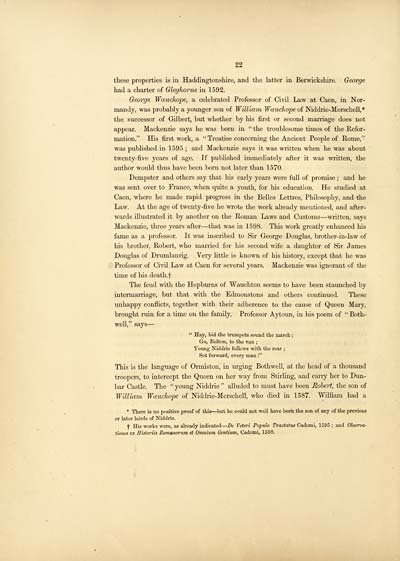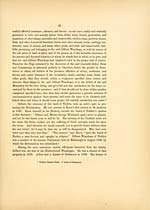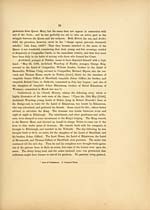Download files
Complete book:
Individual page:
Thumbnail gallery: Grid view | List view

22
these properties is in Haddingtonshire, and the latter in Berwickshire. George
had a charter of Gleghome in 1592.
George Wauchope, a celebrated Professor of Civil Law at Caen, in Nor-
mandy, was probably a younger son of William Wauchope of Niddrie-Merschell,*
the successor of Gilbert, but whether by his first or second marriage does not
appear. Mackenzie says he was born in " the troublesome times of the Refor-
mation." His first work, a " Treatise concerning the Ancient People of Rome,"
was published in 1595 ; and Mackenzie says it was written when he was about
twenty-five years of age. If published immediately after it was written, the
author would thus have been born not later than 1570.
Dempster and others say that his early years were full of promise ; and he
was sent over to France, when quite a youth, for his education. He studied at
Caen, where he made rapid progress in the Belles Lettres, Philosophy, and the
Law. At the age of twenty-five he wrote the work already mentioned, and after-
wards illustrated it by another on the Roman Laws and Customs — written, says
Mackenzie, three years after — that was in 1598. This work greatly enhanced his
fame as a professor. It was inscribed to Sir George Douglas, brother-in-law of
his brother, Robert, who married for his second wife a daughter of Sir James
Douglas of Drumlanrig. Very little is known of his history, except that he was
Professor of Civil Law at Caen for several years. Mackenzie was ignorant of the
time of his death.f
The feud with the Hepburns of Wauchton seems to have been staunched by
intermarriage, but that with the Edmonstons and others continued. These
unhappy conflicts, together with their adherence to the cause of Queen Mary,
brought ruin for a time on the family. Professor Aytoun, in his poem of " Both-
well," says —
" Hay, bid the trumpets sound the march ;
Go, Bolton, to the van ;
Young Niddrie follows with the rear ;
Set forward, every man !"
This is the language of Ormiston, in urging Bothwell, at the head of a thousand
troopers, to intercept the Queen on her way from Stirling, and carry her to Dun-
bar Castle. The " young Niddrie " alluded to must have been Robert, the son of
William Wauchope of Niddrie-Merschell, who died in 1587. William had a
* There is no positive proof of this — but he could not well have been the son of any of the previous
or later lairds of Niddrie.
•j- His works were, as already indicated — Be Veteri Populo Tractatus Cadomi, 1595 ; and Observa-
tienes ex Historiis Romanorum et Omnium Gentium, Cadomi, 1598.
these properties is in Haddingtonshire, and the latter in Berwickshire. George
had a charter of Gleghome in 1592.
George Wauchope, a celebrated Professor of Civil Law at Caen, in Nor-
mandy, was probably a younger son of William Wauchope of Niddrie-Merschell,*
the successor of Gilbert, but whether by his first or second marriage does not
appear. Mackenzie says he was born in " the troublesome times of the Refor-
mation." His first work, a " Treatise concerning the Ancient People of Rome,"
was published in 1595 ; and Mackenzie says it was written when he was about
twenty-five years of age. If published immediately after it was written, the
author would thus have been born not later than 1570.
Dempster and others say that his early years were full of promise ; and he
was sent over to France, when quite a youth, for his education. He studied at
Caen, where he made rapid progress in the Belles Lettres, Philosophy, and the
Law. At the age of twenty-five he wrote the work already mentioned, and after-
wards illustrated it by another on the Roman Laws and Customs — written, says
Mackenzie, three years after — that was in 1598. This work greatly enhanced his
fame as a professor. It was inscribed to Sir George Douglas, brother-in-law of
his brother, Robert, who married for his second wife a daughter of Sir James
Douglas of Drumlanrig. Very little is known of his history, except that he was
Professor of Civil Law at Caen for several years. Mackenzie was ignorant of the
time of his death.f
The feud with the Hepburns of Wauchton seems to have been staunched by
intermarriage, but that with the Edmonstons and others continued. These
unhappy conflicts, together with their adherence to the cause of Queen Mary,
brought ruin for a time on the family. Professor Aytoun, in his poem of " Both-
well," says —
" Hay, bid the trumpets sound the march ;
Go, Bolton, to the van ;
Young Niddrie follows with the rear ;
Set forward, every man !"
This is the language of Ormiston, in urging Bothwell, at the head of a thousand
troopers, to intercept the Queen on her way from Stirling, and carry her to Dun-
bar Castle. The " young Niddrie " alluded to must have been Robert, the son of
William Wauchope of Niddrie-Merschell, who died in 1587. William had a
* There is no positive proof of this — but he could not well have been the son of any of the previous
or later lairds of Niddrie.
•j- His works were, as already indicated — Be Veteri Populo Tractatus Cadomi, 1595 ; and Observa-
tienes ex Historiis Romanorum et Omnium Gentium, Cadomi, 1598.
Set display mode to:
![]() Universal Viewer |
Universal Viewer | ![]() Mirador |
Large image | Transcription
Mirador |
Large image | Transcription
Images and transcriptions on this page, including medium image downloads, may be used under the Creative Commons Attribution 4.0 International Licence unless otherwise stated. ![]()
| Histories of Scottish families > History and genealogy of the family of Wauchope of Niddrie-Merschell > (30) Page 22 |
|---|
| Permanent URL | https://digital.nls.uk/95384667 |
|---|
| Description | A selection of almost 400 printed items relating to the history of Scottish families, mostly dating from the 19th and early 20th centuries. Includes memoirs, genealogies and clan histories, with a few produced by emigrant families. The earliest family history goes back to AD 916. |
|---|

